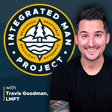
Finding Balance: Navigating Joy and Grief During the Holiday Season
Welcome to the Therapy4Dads Podcast! In this solo episode, we delve into the holiday season, addressing the need to balance joy and grief. I share personal experiences and professional insights on navigating difficult emotions during this time of year. I emphasizes the importance of acknowledging reality without judgment and validating our own and others' feelings. I highlights the power of resilience, connection, and sharing experiences with safe individuals. As the year comes to a close, I encourage you to seek balance, empathy, and self-care. Stay tuned for upcoming exciting news and site changes. With a wish for the capacity for balance, empathy, and love, I leave you with a message of hope and care.
WATCH ON YOUTUBE:
SUPPORT THE SHOW:
CLICK HERE: BuyMeACoffee/Therapy4Dads
JOIN the MAILING LIST & GET INVOLVED!
Connect and Support Travis:
YouTube: Travis Goodman
Instagram: @Therapy4Dads
Check out the Website: Therapy4Dads.com





